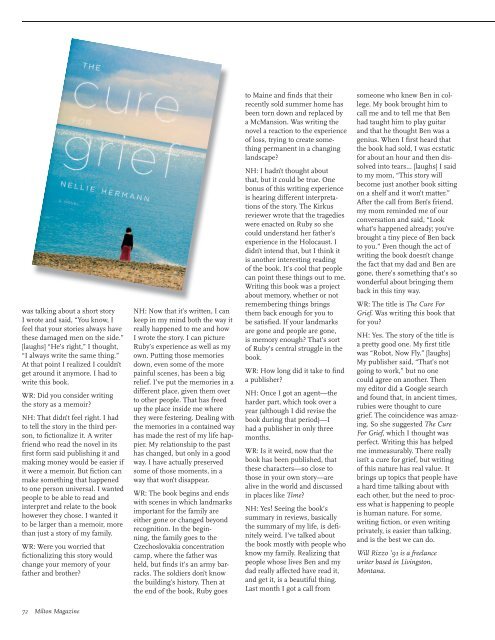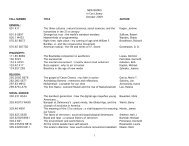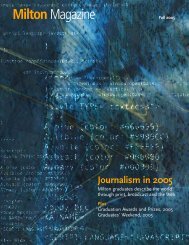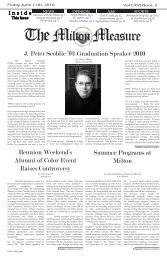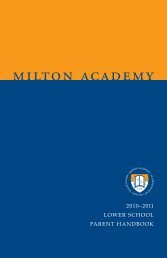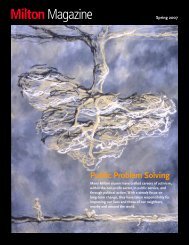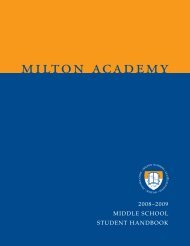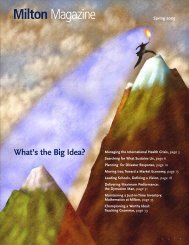Milton Magazine - Milton Academy
Milton Magazine - Milton Academy
Milton Magazine - Milton Academy
- No tags were found...
You also want an ePaper? Increase the reach of your titles
YUMPU automatically turns print PDFs into web optimized ePapers that Google loves.
was talking about a short storyI wrote and said, “You know, Ifeel that your stories always havethese damaged men on the side.”[laughs] “He’s right,” I thought,“I always write the same thing.”At that point I realized I couldn’tget around it anymore. I had towrite this book.WR: Did you consider writingthe story as a memoir?NH: That didn’t feel right. I hadto tell the story in the third person,to fictionalize it. A writerfriend who read the novel in itsfirst form said publishing it andmaking money would be easier ifit were a memoir. But fiction canmake something that happenedto one person universal. I wantedpeople to be able to read andinterpret and relate to the bookhowever they chose. I wanted itto be larger than a memoir, morethan just a story of my family.WR: Were you worried thatfictionalizing this story wouldchange your memory of yourfather and brother?NH: Now that it’s written, I cankeep in my mind both the way itreally happened to me and howI wrote the story. I can pictureRuby’s experience as well as myown. Putting those memoriesdown, even some of the morepainful scenes, has been a bigrelief. I’ve put the memories in adifferent place, given them overto other people. That has freedup the place inside me wherethey were festering. Dealing withthe memories in a contained wayhas made the rest of my life happier.My relationship to the pasthas changed, but only in a goodway. I have actually preservedsome of those moments, in away that won’t disappear.WR: The book begins and endswith scenes in which landmarksimportant for the family areeither gone or changed beyondrecognition. In the beginning,the family goes to theCzechoslovakia concentrationcamp, where the father washeld, but finds it’s an army barracks.The soldiers don’t knowthe building’s history. Then atthe end of the book, Ruby goesto Maine and finds that theirrecently sold summer home hasbeen torn down and replaced bya McMansion. Was writing thenovel a reaction to the experienceof loss, trying to create somethingpermanent in a changinglandscape?NH: I hadn’t thought aboutthat, but it could be true. Onebonus of this writing experienceis hearing different interpretationsof the story. The Kirkusreviewer wrote that the tragedieswere enacted on Ruby so shecould understand her father’sexperience in the Holocaust. Ididn’t intend that, but I think itis another interesting readingof the book. It’s cool that peoplecan point these things out to me.Writing this book was a projectabout memory, whether or notremembering things bringsthem back enough for you tobe satisfied. If your landmarksare gone and people are gone,is memory enough? That’s sortof Ruby’s central struggle in thebook.WR: How long did it take to finda publisher?NH: Once I got an agent—theharder part, which took over ayear (although I did revise thebook during that period)—Ihad a publisher in only threemonths.WR: Is it weird, now that thebook has been published, thatthese characters—so close tothose in your own story—arealive in the world and discussedin places like Time?NH: Yes! Seeing the book’ssummary in reviews, basicallythe summary of my life, is definitelyweird. I’ve talked aboutthe book mostly with people whoknow my family. Realizing thatpeople whose lives Ben and mydad really affected have read it,and get it, is a beautiful thing.Last month I got a call fromsomeone who knew Ben in college.My book brought him tocall me and to tell me that Benhad taught him to play guitarand that he thought Ben was agenius. When I first heard thatthe book had sold, I was ecstaticfor about an hour and then dissolvedinto tears... [laughs] I saidto my mom, “This story willbecome just another book sittingon a shelf and it won’t matter.”After the call from Ben’s friend,my mom reminded me of ourconversation and said, “Lookwhat’s happened already; you’vebrought a tiny piece of Ben backto you.” Even though the act ofwriting the book doesn’t changethe fact that my dad and Ben aregone, there’s something that’s sowonderful about bringing themback in this tiny way.WR: The title is The Cure ForGrief. Was writing this book thatfor you?NH: Yes. The story of the title isa pretty good one. My first titlewas “Robot, Now Fly.” [laughs]My publisher said, “That’s notgoing to work,” but no onecould agree on another. Thenmy editor did a Google searchand found that, in ancient times,rubies were thought to curegrief. The coincidence was amazing.So she suggested The CureFor Grief, which I thought wasperfect. Writing this has helpedme immeasurably. There reallyisn’t a cure for grief, but writingof this nature has real value. Itbrings up topics that people havea hard time talking about witheach other, but the need to processwhat is happening to peopleis human nature. For some,writing fiction, or even writingprivately, is easier than talking,and is the best we can do.Will Rizzo ’91 is a freelancewriter based in Livingston,Montana.72 <strong>Milton</strong> <strong>Magazine</strong>


